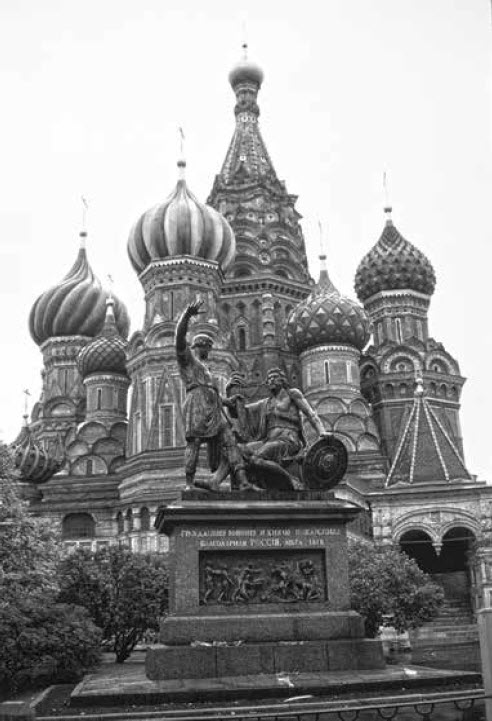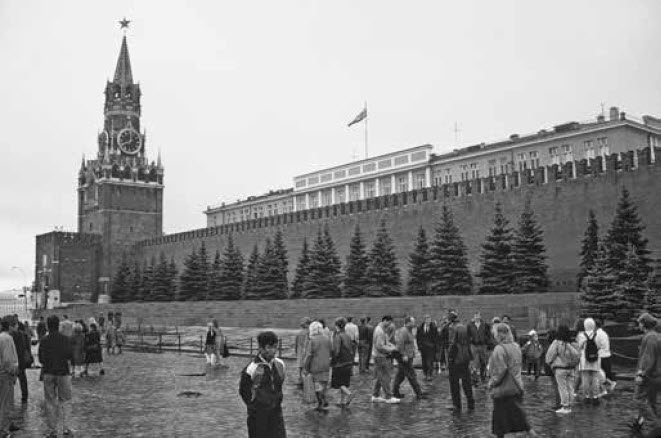They wanted to know if I was interested in going big game hunting in the Soviet Union.

St. Basil’s Cathredal is one of the most iconic sights on the Red Square. It was built in 1555 by Czar Ivan the Terrible.(Denny Geurink photo)
It began in August, 1991, when I received a call from Bob Knoop, a booking agent in Dearborn, Michigan. He wanted to know if I would be interested in joining him and a few other guys on a trip in September to the Soviet Union to go big game hunting. I thought he was pulling my leg.
“Sure, and then you can come along with me on an exploratory trip to the moon,” I said, chuckling.
“No, I’m serious,” Knoop said.
“A hunting trip to the Soviet Union?”
“Yes,” he answered. “Are you interested?”
Does a bear…in the woods?
Upon further questioning, I learned that Knoop was working with the Russians to set up this trip via a company called CMI International. The people at CMI had been collaborating with the Russian government on a mining project when the subject of big game hunting came up. Seems the Russians were interested in getting into the tourism business. It was the era of Glasnost, Perestroika, and Gorbachev was reaching out to the outside world. They wanted to set up an exploratory big game hunt and have an American writer come for a visit, to show him what they had to offer.
Knoop had read my work in Field & Stream (I was a regional editor) and thought I’d be a good fit. Thus the call. The clincher was when Knoop said the trip would not cost me anything. They were planning to give me the trip in hopes of generating publicity for this new hunting frontier. The price certainly was right.
How was I to know I’d end up doing such things as road hunting from a Russian army tank in Siberia? How about stalking red stag with the KGB on a Soviet naval base a few miles from where Gorbachev had been placed under house arrest a few months earlier? How about sharing vodka toasts with the Vice President of Crimea?
I ended up doing all of those things, and more! If you have trouble believing it, you know how I felt later while it was happening.
Preparations for the trip ran smoothly until August 19, 1991, when my wife came into the bedroom at 7 a.m. and said, “You’d better get up and turn on the TV. I just heard on the radio there was a coup in Russia.”
“A COUP?” I vaulted from the bed. “I get a chance to go to Russia and they decide to have a coup! You’re kidding?”
Unfortunately, she wasn’t kidding. The early news reports were saying that Gorbachev was “too ill” to continue in his post as president of the Soviet Union. A group of new leaders was taking over.
It wasn’t long before the truth came out. The Communist Party hierarchy didn’t like the direction Gorbachev was taking the country. All this talk of Glasnost and Perestroika — and exploratory hunting trips — wasn’t sitting well with them. In reality, Gorbachev had been placed under house arrest in a resort area near the Black Sea.
When we inquired about the status of the trip, we were told we were still welcome, but we weren’t feeling that welcome. We didn’t want to jump into the middle of a political crisis. If Mr. Glasnost wasn’t going to be around, we weren’t sure we were interested.
We felt much better about the situation several days later when the coup failed. The hunt was on.
Unfortunately, the instability knocked our departure date back to September 27. This meant the brown bears we hoped to hunt might already be denned by the time we got to camp in early October. Also, wild boar would be more difficult to hunt with crops out of the fields. We would still have moose, red stag, roe deer, and plenty of birds to chase. Plus, plans allowed for a day in Moscow and Leningrad (now St. Petersburg). That was good enough for me.
The big day finally arrived. After a short connecting flight from Grand Rapids, Michigan, to New York, we found ourselves aboard a 747 heading for Moscow. This was my first trip overseas. We were about halfway across the Atlantic before reality began to sink in. I was on my way to Russia! Unbelievable!
Making the trip with me, along with Knoop, were Ed Stone, a booking agent from Grand Rapids, Michigan, and Terry Geurink, a cousin from Wyoming, Michigan. I had worked out an arrangement with CMI for Terry to come along as a photography and videography aide to document this historic trip.
We met Phil Belsito, a vice president with CMI, at the airport in New York. On board the plane we met John Hodge, Executive Vice President at CMI, and Lance Parker, a client of CMI. Everyone was pumped. We chattered excitedly the entire flight.

Red Square: Once off limits to foreigners but is now one of the most popular tourist destinations in the world (Denny Geurink photo)
What had started out as a hunting expedition in the U.S. quickly turned into an outright adventure the minute the wheels of Pan Am Flight 30 hit the runway in Moscow. It took a minute for reality to sink in as we taxied down the runway to the terminal. We were surprised by the dark and dreary appearance of the terminal compared to airport terminals in the United States. Not much lighting, no little shops, eateries or stands. The terminal’s interior reminded me of the inside of a storage shed.
We arrived in Moscow at 9:30 a.m. Saturday, the 28th.
Dmitri Sikorski, a tall man in his late twenties and a CMI contact in Russia, met us at the airport. I was surprised by how well he spoke English. Many people who learn English as a second language have quite an accent, but he had very little. He spoke American English, not British English, as most of our interpreters later on did. He had learned the language on his own, not in a formal program at a school. Dmitri said he would be our interpreter and tour guide for the next two weeks. He had made all the arrangements for our in-country travel, hotels, and stays at the hunting camps.
One thing I learned immediately was that Dmitri was from the Ukraine. “I’m not a Russian,” he corrected when I introduced him to the rest of our crew, “I’m Ukrainian.”
It’s a distinction people from the Ukraine and other Soviet Bloc countries repeatedly pointed out. If they were from a Soviet Bloc country like Romania, Czechoslovakia or the Ukraine, and not from Russia, they didn’t want to be called Russians. In fact, they even seemed a bit offended by it.
I asked Dmitri why the big fuss? “In the U.S. we are from different states but refer to ourselves as Americans. Why do people from the countries who joined the Soviet Union not want to be called Russians?”
“There’s a big difference in the way the states in America joined the union and the way the states of the Soviet Union joined,” Dmitri pointed out. “In the U.S., the states all petitioned to become part of the union. We didn’t petition to become part of the Soviet Union. We were annexed.”
Yes, you could say that is a big difference. Just one of the many things we all learned about the former Soviet Union and Russia on this trip.
For details, and to order IN THE LAND OF THE BEAR, go to www.targetcommbooks.com
IN THE LAND OF THE BEAR
by Dennis Geurink
Paperback, 6″ x 9″, 280 pages
About Denny Geurink
Denny was an elementary math, science and English teacher 1969-1985 in Jenison, Michigan. He wrote a weekly outdoor column that appeared in more than 10 different newspapers 1972-2012 and was Midwest Editor for FIELD & STREAM magazine 1985-1992. He was the host of a weekly outdoor TV show 1993-2004.
He led hunting and fishing expeditions to Russia 1991-2018 during which time he became the No. 1 Brown bear outfitter in the world!
His book is all about the danger and adventure of hunting brown bear in Russia’s forbidding Siberia, in a strange land among a foreign culture. It has 23 exciting, sometimes danger-filled, chapters.

